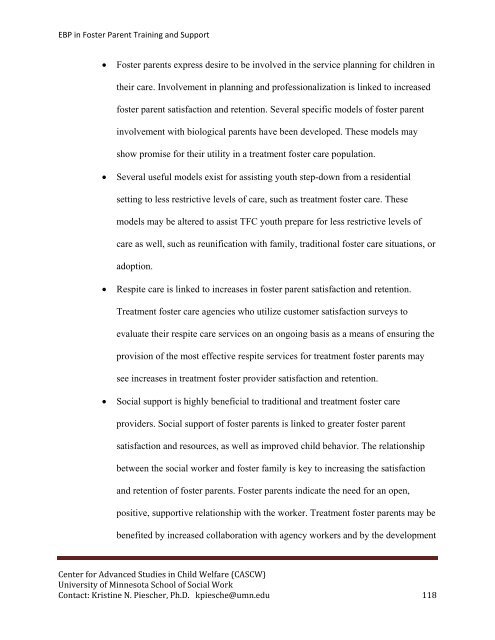Evidence-Based Practice in Foster Parent Training and Support ...
Evidence-Based Practice in Foster Parent Training and Support ...
Evidence-Based Practice in Foster Parent Training and Support ...
Create successful ePaper yourself
Turn your PDF publications into a flip-book with our unique Google optimized e-Paper software.
EBP <strong>in</strong> <strong>Foster</strong> <strong>Parent</strong> Tra<strong>in</strong><strong>in</strong>g <strong>and</strong> <strong>Support</strong>• <strong>Foster</strong> parents express desire to be <strong>in</strong>volved <strong>in</strong> the service plann<strong>in</strong>g for children <strong>in</strong>their care. Involvement <strong>in</strong> plann<strong>in</strong>g <strong>and</strong> professionalization is l<strong>in</strong>ked to <strong>in</strong>creasedfoster parent satisfaction <strong>and</strong> retention. Several specific models of foster parent<strong>in</strong>volvement with biological parents have been developed. These models mayshow promise for their utility <strong>in</strong> a treatment foster care population.• Several useful models exist for assist<strong>in</strong>g youth step-down from a residentialsett<strong>in</strong>g to less restrictive levels of care, such as treatment foster care. Thesemodels may be altered to assist TFC youth prepare for less restrictive levels ofcare as well, such as reunification with family, traditional foster care situations, oradoption.• Respite care is l<strong>in</strong>ked to <strong>in</strong>creases <strong>in</strong> foster parent satisfaction <strong>and</strong> retention.Treatment foster care agencies who utilize customer satisfaction surveys toevaluate their respite care services on an ongo<strong>in</strong>g basis as a means of ensur<strong>in</strong>g theprovision of the most effective respite services for treatment foster parents maysee <strong>in</strong>creases <strong>in</strong> treatment foster provider satisfaction <strong>and</strong> retention.• Social support is highly beneficial to traditional <strong>and</strong> treatment foster careproviders. Social support of foster parents is l<strong>in</strong>ked to greater foster parentsatisfaction <strong>and</strong> resources, as well as improved child behavior. The relationshipbetween the social worker <strong>and</strong> foster family is key to <strong>in</strong>creas<strong>in</strong>g the satisfaction<strong>and</strong> retention of foster parents. <strong>Foster</strong> parents <strong>in</strong>dicate the need for an open,positive, supportive relationship with the worker. Treatment foster parents may bebenefited by <strong>in</strong>creased collaboration with agency workers <strong>and</strong> by the developmentCenter for Advanced Studies <strong>in</strong> Child Welfare (CASCW)University of M<strong>in</strong>nesota School of Social WorkContact: Krist<strong>in</strong>e N. Piescher, Ph.D. kpiesche@umn.edu 118
















